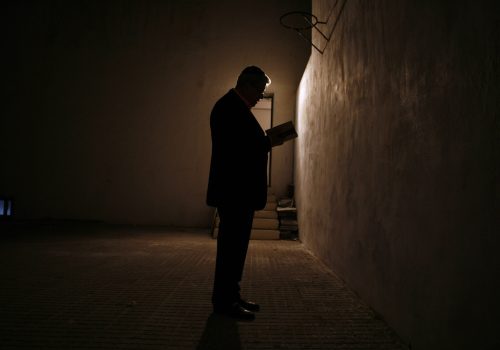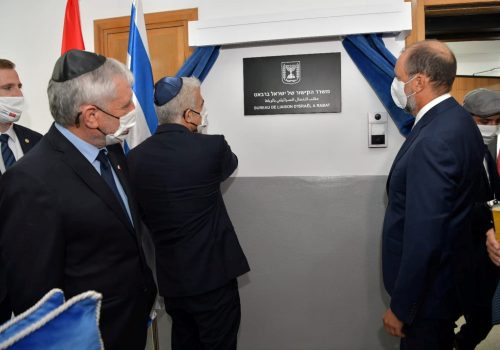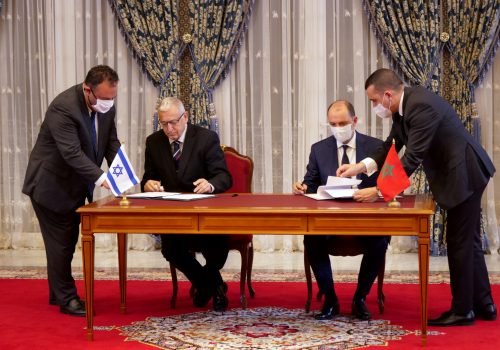How Cabo Verde is highlighting the rich history of the Jewish people in Africa
A decade ago, Cabo Verde, a predominantly Christian country, restored its Jewish cemeteries under the patronage of a Muslim leader, King Mohammed VI of Morocco. This vibrant example of Africa’s historical, cultural, and religious diversity was celebrated on March 6, when an assembly of Jews, Christians, and Muslims gathered in Praia, the country’s capital, to commemorate years of efforts to conserve an essential aspect of Cabo Verde’s past. This achievement transcends a single community and embraces a larger vision of Cabo Verdean society. The Jewish cemeteries are now not merely materialized memories but pivotal platforms for fostering interfaith dialogue and, by embodying the spirit of unity in diversity, have become beacons of inspiration for generations.
The restored Jewish cemetery in Praia—more precisely, the Jewish section of an interfaith cemetery—was reinaugurated in 2013 after a collaboration between the Municipal Chamber of Praia and the Cabo Verde Jewish Heritage Project, with the support of Morocco’s king. The Cabo Verde Jewish Heritage Project worked closely with the Cabo Verdean Ministry of Communities and the National Library of Cabo Verde to coordinate the celebration, which included the unveiling of commemorative plaques and a conference at the National Library exploring the legacy of Moroccan Jews in Cabo Verde. This event brought together scholars, historians, and descendants of Cabo Verde’s Moroccan Jews for a dialogue about their profound historical and cultural impact.
The origins of Cabo Verde’s Jewish communities date back to the nineteenth century, starting with the arrival of Moroccan Jews from cities like Tangier, Tetouan, Rabat, Essaouira, and Gibraltar in search of economic opportunities. These communities left a lasting impression on the archipelago’s history by contributing significantly to its cultural and economic development. The descendants of Moroccan Jews in Cabo Verde still have their Sephardic names—such as Auday, Brigham, and Cohen—and descendants of these families speak with great pride of their Jewish ancestors and honor their legacy by preserving their Jewish heritage. The resurrection of this house of life, which was falling into disrepair and represents the Jewish Moroccan presence in this Atlantic archipelago, is a profound act that transcends merely dusting off the collective memory. Restoring the cemetery of Praia is an acknowledgment of the historical connection, the influence of the Moroccan Jewish community, and the safeguarding of their heritage and preventing it from being lost to time.
SIGN UP FOR THIS WEEK IN THE MIDEAST NEWSLETTER
In its steadfast pursuit of fostering convivencia and interfaith dialogue, Cabo Verde has worked to recognize and respect cultural diversity. This has been achieved by embracing Moroccan and Gibraltarian Jewish heritage as an integral part of Cabo Verde’s national heritage. In doing so, Cabo Verde commemorates the diverse heritage of its multicultural past and honors the profound bonds between Cabo Verde and Morocco today—specifically their shared values and mutual dedication to upholding the principles of religious and cultural pluralism.
This reciprocal acknowledgment and the elevation of Jewish heritage as a pivotal element of Cabo Verde’s national heritage is an expression of the commitment of Cabo Verde and Morocco to fostering peace and valuing diversity. This ten-year-old project’s continued relevance is a poignant symbol of the myriad steps taken to forge a more inclusive and cohesive society. Cabo Verde’s initiative goes beyond merely safeguarding its varied cultural and religious identity; it fortifies the bridges of comprehension and mutual respect with Morocco, underscoring the crucial role of diversity in underpinning national unity and social harmony.
Moreover, Morocco and Cabo Verde’s joint efforts exemplify the essence of intra-African collaboration dialogue, including respect for diversity and the recognition that harmonious living among communities is pivotal for societal advancement and overall stability. This approach paves the way for a peaceful and prosperous Africa, embracing inclusivity and convivencia as cornerstones for progress.
Highlighting this, Minister of Cabo Verdean Communities Jorge Santos signed the Call of Rabat for the Preservation of the African Jewish Heritage during the second annual Jewish Africa Conference in 2022. African leaders, as well as friends of the Jewish community in Africa, signed the call, which invites all parties involved—individuals, civil society, and governments—to acknowledge the rich history of the Jewish people in Africa and the need to protect and make accessible Jewish historical sites across the continent; to strengthen the sacred “chords of memory” that connect various generations and peoples to the African Jewish experience, particularly through cultural and educational initiatives; to give African youths the tools they need to preserve, propagate, and celebrate African Jewish cultures; to collaborate in the preservation, restoration, and renovation of significant Jewish sites on the African continent; and to establish a mechanism to further these objectives as well as to provide opportunities for African Jewish voices.
The Call of Rabat is a considerable effort to unite and celebrate the rich diversity of African-Jewish and non-Jewish communities. Africa’s history, culture, and religion are woven together like a complex tapestry with strands of coexistence, unity, and togetherness, as evidenced by Cabo Verde’s restoration of Jewish cemeteries. Judaism in Africa has grown from biblical times to the present, symbolizing the continent’s rare ethnic and religious diversity. Beyond bridging historical gaps, the Call of Rabat opens the door to a future in which diversity and unity combine to form a peaceful, inclusive society by bolstering the presence of Judaism in Africa.
From Rabat to Praia, a new generation of African leaders is reclaiming their Jewish history and realizing a brighter future.
El Mehdi Boudra is a nonresident senior fellow at the Atlantic Council’s N7 Initiative and the founder and president of Mimouna Association, a Moroccan nongovernmental organization. Follow him on X: @ElBoudra.
Further reading
Fri, Dec 2, 2022
Morocco is building bridges to connect its youth with its Moroccan Jewish cultural heritage. Here’s how.
MENASource By El Mehdi Boudra
Morocco’s continuation of decades-long efforts to safeguard the Moroccan Jewish heritage is integral to combating extremism and hatred and fostering interreligious dialogue.
Thu, Oct 7, 2021
Morocco and Israel are friendlier than ever thanks to the Abraham Accords. But what does this mean for the rest of North Africa?
MENASource By Karim Mezran, Alissa Pavia
The agreement between Israel and Morocco sparked a series of chain events in neighboring North African countries that will likely have lasting consequences on the economic, security, and socio-political relations in the region.
Thu, Dec 24, 2020
How Moroccans reacted to normalization with Israel
MENASource By
Moroccans were not surprised to see their country became the fourth Arab nation to normalize relations with Israel—it was the US’s recognition of Western Sahara that astonished them since Morocco’s identity is intertwined with that of Western Sahara.
Image: Tombs in the Jewish cemetery in the Jewish quarter of the Medina (old city) of Fez (Fes) in Morocco, Africa, on December 31, 2015. This Jewish Cemetery has existed since the early 19th century. The ancient city of Fez (Fes) is the second largest city of Morocco and the city has often been called the 'Mecca of the West' and the 'Athens of Africa'. (Photo by Creative Touch Imaging Ltd./NurPhoto)


